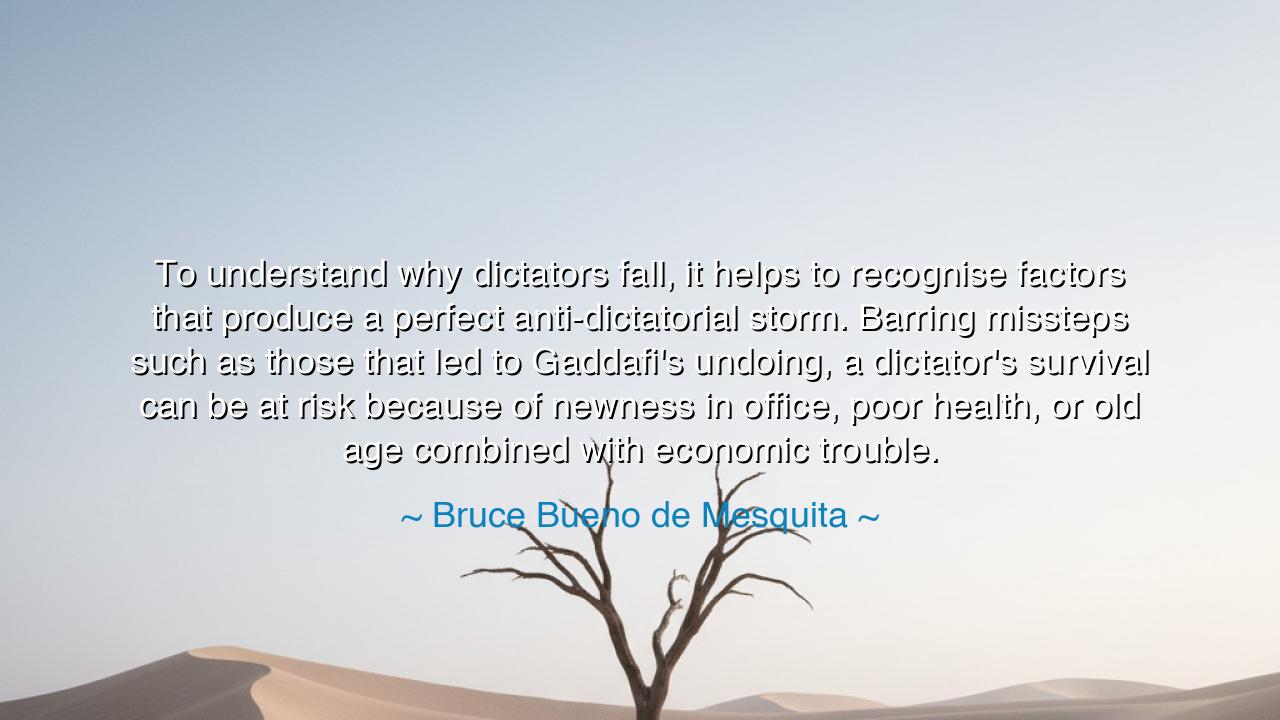
To understand why dictators fall, it helps to recognise factors
To understand why dictators fall, it helps to recognise factors that produce a perfect anti-dictatorial storm. Barring missteps such as those that led to Gaddafi's undoing, a dictator's survival can be at risk because of newness in office, poor health, or old age combined with economic trouble.






Hear now, O children of wisdom, the words of Bruce Bueno de Mesquita, who speaks with insight into the fragile nature of power: "To understand why dictators fall, it helps to recognise factors that produce a perfect anti-dictatorial storm. Barring missteps such as those that led to Gaddafi's undoing, a dictator's survival can be at risk because of newness in office, poor health, or old age combined with economic trouble." These words echo the ancient truths about power—how it can be both intoxicating and fleeting, a force that rises on the shoulders of fear and dominance, but one that can be easily undone by weakness, change, and the forces of time.
In the days of old, great rulers rose from humble beginnings, wielding power as a sword and a shield. Their reigns were marked by force, by the will to impose their vision upon the world. Consider Alexander the Great, who conquered vast lands at a young age, his empire stretching from Greece to the Indian subcontinent. His power seemed unassailable, and yet, it was fragility—both in his health and his youth—that led to his downfall. He did not survive to grow old, and his empire, built on a foundation of military might, crumbled after his untimely death. Even the mightiest of rulers, those who appeared as gods to their people, are susceptible to the storms that brew from within their own reign.
Dictators, like the ancient kings, stand at the apex of their kingdoms, holding the fate of nations in their hands. They are men and women who rule not with the consent of the governed, but with the force of authority, crushing opposition and molding the will of the people. However, as Bueno de Mesquita wisely notes, dictators are not eternal. The very factors that elevate them to power—youth, health, economic stability—are also those that can threaten their survival. When a dictator is new to office, their power may seem fresh, yet it is untested, fragile, vulnerable to the forces of time and the changing will of the people. It is in the newness of their reign that they must prove themselves, and if they fail to do so, their grip on power will weaken.
Consider, O wise ones, the fall of Muammar Gaddafi, whose reign in Libya lasted for over four decades. He was a ruler who understood well the nature of power, using it to silence dissent and hold sway over the people. Yet, as Bueno de Mesquita suggests, Gaddafi’s missteps—his increasing isolation, his disregard for the rising demands of his people, and his underestimation of the power of the global community—led to his undoing. The people of Libya, driven by the winds of revolution, rose up against his rule, and in the face of economic troubles, international pressure, and his own declining health, Gaddafi's reign ended in violent overthrow. The very factors that had once sustained his power—his youthful energy at the start of his rule, his ability to maintain control over Libya’s resources—were eroded by time, internal strife, and the pressures of a changing world.
The fall of dictators throughout history, whether Gaddafi, Saddam Hussein, or Benito Mussolini, all share common threads: the impermanence of power in the hands of one man or woman, and the factors that lead to their decline. Poor health, the weight of old age, the economic troubles that begin to erode the foundation of their rule—these are the very seeds of vulnerability. When the dictator can no longer maintain the awe and fear of the people, when they are forced to face the realities of their weakness, the storm that has been brewing within their empire can no longer be contained. The winds of change, driven by discontent and the rising tides of revolution, can sweep them from power with startling speed.
What, then, O children, is the lesson we must learn from these ancient and modern examples? Power is not a thing to be taken lightly. The dictator may rise on the wings of force and ambition, but their reign is often fragile, their fate determined by factors outside their control. A ruler who does not cultivate the support of their people, who fails to adapt to the changing world, who ignores the strength of the forces that can tear them down, will inevitably face their own downfall. Power is best held not with a clenched fist, but with wisdom, with understanding of the fragile nature of authority and the humility to acknowledge that time and change will one day render all rulers vulnerable.
Therefore, O children of the future, take this wisdom to heart: if you seek power, seek not the temporary glory that comes with force and fear, but the lasting strength that comes from understanding the nature of human frailty and the power of change. Let the dictators of history be your teachers, reminding you that nothing is eternal, and that even the greatest of empires are built upon the fragile hearts of those who lead them. May you rule with wisdom, with foresight, and with an understanding that power, when it is not nurtured with the care of justice, can easily be lost to the winds of time and misfortune.






AAdministratorAdministrator
Welcome, honored guests. Please leave a comment, we will respond soon